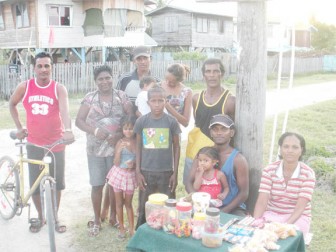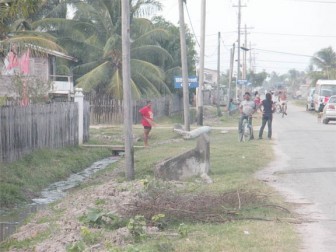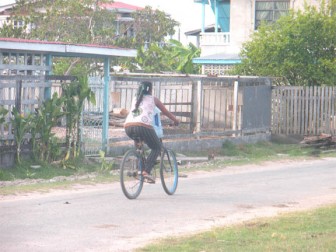Story and photos by Chevy Devonish
Located approximately 14 miles from Georgetown and nestled neatly between Paradise and Enmore is the homey little village of Foulis. Although 14 miles may not be much it does not take long for to realise that this village seems like a completely different world.
Far removed from the hustle and bustle lifestyle of the city, the approximately 953 residents of this small village admittedly embrace a much quieter and easy going existence.
When Sunday Stabroek visited the village, Desma Pitt was going about her afternoon routine of getting her shop ready for business. Desma, her husband Godfrey Pitt and their five children reside in a house they built themselves on the border of Foulis and Paradise. The family operates a small bar a few feet off the Railway Embankment, near the Foulis Bridge. Desma related that when she and her family moved to the location in 1992, the highway now also colloquially referred to as the “line top” was still an actual railway line. In addition to this she said that both sides of the embankment were filled with “bush, is we come and clean away de bush where we house deh now and we did put up a lil shack,” further explained Desma.
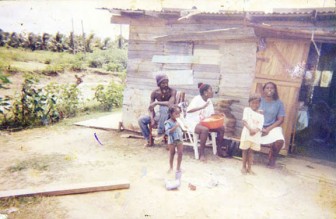
they had built back in 1992, when they first moved to Foulis.
A few feet further into the village and a turn left brings you to the Foulis Housing Scheme. Not the magnitude, and volume of the Providence or Diamond housing schemes, the Foulis Housing Scheme is a small, tightly-knit set up. The community has exactly 20 streets from front to back each of them named according to their ordinal numbers — first through twentieth.
This newspaper was lucky enough to chance upon Mala, a resident of the relatively recently developed village. Mala, who has lived at Foulis for 16 years and shares a home her mother Jean, and her daughter Anjanie spoke of the quite nature of her village.
She stated that she moved into the scheme in either 1996 or 1997, and at that point there were only four other houses in the area. At that time there were no roads, instead mud dams were built so that people could access their houses, and to facilitate the building of other homes. “This caused a problem because whenever the rain fall it would wash the mud away, the people from the community would have to dig up more mud and build up back the dams them so we could walk.” She said drainage in the community was very bad and that the slightest of rainfall would cause serious flooding.
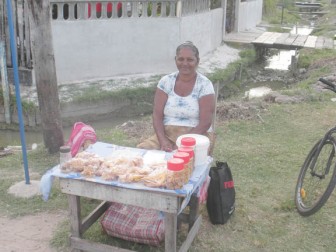
Though the 2005 Great Flood will undoubtedly be remembered by all Guyanese who were alive at that time, it was certainly etched into the brains of Mala and her family. Mala shared that Foulis was one of the hardest hit villages during the crisis. “The flooding was very, very bad man. The rain keep falling and the water kept rising till half de whole house did under water. We save what we could, but almost everything get damaged and had to throw away. Fridge, bed, documents, clothes, furniture, all had to throw away.”
One would think that recalling such a tragedy would sour the mood of the victim of such an occurrence, however if this was the case Mala never showed it. Maintaining a positive, optimistic demeanour Mala went on to share that the drainage of the community today is much better than before, and that she could not recall when last they had any serious flooding.
Sunday Stabroek also noticed, upon traversing the streets of Foulis that there were hardly any people walking about, liming at corners or shops. When asked about this, Mala revealed that many, if not most residents of Foulis worked on the sugar estates and that when they get home they are usually tired. “When people come home in the afternoon or late on the evening they does be really
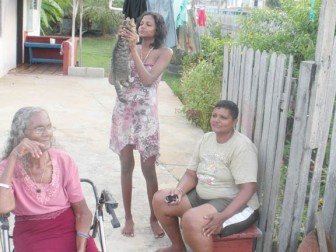
(centre) and her mother Jean and the
family’s cat Sarafina
tired so they don’t really go walking about or liming. By six or seven the roads are clear and even the shops are closed up because they does got to wake up early again to go to work. People in here don’t really lime. The most we would do is come out at we gate as a family and talk. We would share we day, talk and laugh about things that happened during the day and suh.”
This newspaper was fortunate enough to encounter Mala and her family during one such session and was invited to partake.
Mala shared that her daughter had recently visited Suriname and had taken Sarafina, the family’s cat along for the journey. Her daughter is supposed to take another trip to Suriname soon, and that the cat is once again expected to take the trip.
It was also stated that even children are usually inside their houses, though at times it is quite possible to see children out on the streets playing cricket, football or fishing in the drains that run throughout the village.
It should be noted at this point there are no nursery, primary, or secondary schools in Foulis. Children of the nursery and primary and secondary levels attend the schools found in Enmore, and even as far as Annandale. Some of the residents shared plans to construct a school in the community so the children wouldn’t have to travel far. The residents identified a field located near the Mandir which they say is the selected area for the Foulis Primary and Secondary
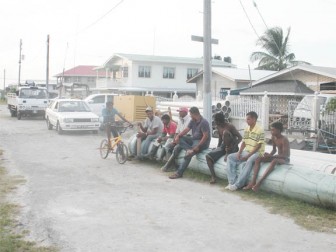
Some of these same youth participated in the
community-wide clean up of the ball field
School. The site for the nursery school is near the bridge that joins Foulis and Hope.
Residents stated that the community is predominantly of East Indian origin and that most of its occupants are Hindu, though there are a few Christians and Muslims.
Foulis is home to one Temple, where the community’s Hindus worship, and two churches, both of which are kept in the bottom flats of houses. There are no Mosques in the community which means that Muslims in that community usually journey to Mosques in surrounding neighbourhoods to worship.
Residents said that the only occasion where the entire community comes out and interacts at one time “is when we get barbecue.” Residents say that about once every two weeks a barbecue is held in the Foulis Ball field. The field itself, which was once overrun with bush, was cleaned by community members who wanted to create a place they could gather for social events. The young men who related this story seemed quite proud of the achievement and stated that a lot of work went into the effort.
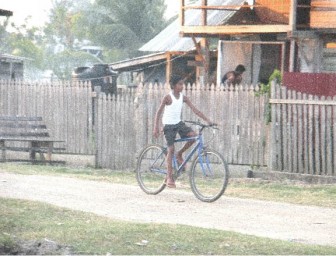
The village is devoid of a post office, police outpost or medical facilities, which means that the people usually have to travel to other villages to access these services.
